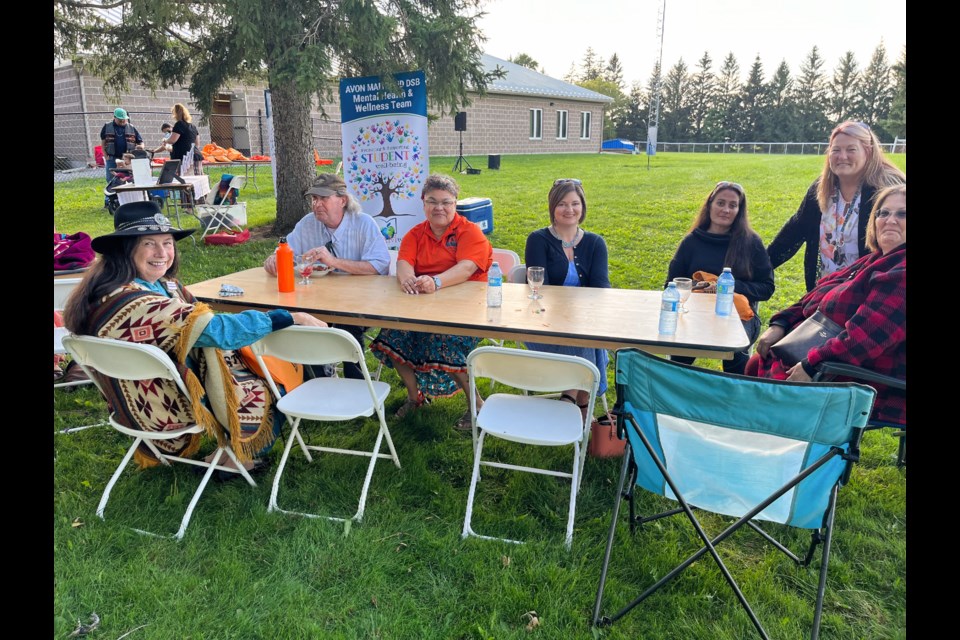Students, staff and families of the Avon Maitland District School Board (AMDSB) has a pair of opportunities coming up to experience Indigenous culture on deeper levels, and it all starts with the board’s annual Indigenous feast.
On Sunday, Oct. 6, the AMDSB will host its third annual Indigenous feast at the Brodhagen Community Centre. Running from 1-6 p.m., students and their families from across the board can gather to experience Indigenous elders and knowledge carriers as they share their wisdom. The event will also feature games and giveaways along with the complementary supper.
Then on October 7, the board will begin offering Anishinaabemowin language lessons with Russell Peltier in an online setting. The lessons offer a richer insight into the Indigenous people of this area, while helping to build connections and relationships. Lessons are scheduled for Monday nights between 6-7 p.m.
Matt Baker, the Indigenous education lead for AMDSB, said that both the feast and language lessons are engaging ways to help students and their families learn about Indigenous culture while helping them put things more into context as they experience them. Having them both in close proximity to the September 30 National Day of Truth and Reconciliation also helps foster a learning environment.
“That can be a heavy day for a lot of Indigenous people for obvious reasons, so I made the decision this year that we would do the feast in a happy time to celebrate our culture,” Baker said. “Having it the weekend after (September 30) gives us the chance to have our history and deal with the trauma and awful things that have happened in the past but also a chance to celebrate our culture, which I think is one of the most beautiful cultures in the world.”
By putting emphasis on things like Indigenous music, food and dress and what that represents, Baker said the focus is on things that matter when it comes to teaching about Indigenous culture.
“Part of the Truth and Reconciliation report and the calls to action that the government has put out is trying to really make sure we’re using an Indigenous education model that focuses on the things that matter,” he said. “Indigenous education isn’t just history and you can’t learn culture in a book. A vast majority of Indigenous cultures intends you to learn the culture by doing your culture, so to bring in pow wow drummers and jingle dancers and Indigenous singers and hand drummers gives students a hands-on educational experience that hopefully gets them to fall in love with our culture and see how it's done by the people who know it very well.”
By offering the Anishinaabemowin language lessons, Baker said students will be learning the language of a large group of people from around the Great Lakes region. And by extending that offer to student’s families, he’s hoping that will encourage them to stick with the learning process outside of their once-a-week lessons.
“In offering the language lessons to parents and staff rather than just the students goes back to an idea when I worked at an Indigenous friendship centre,” he said. “Everything we do as Indigenous people is to create healthy, proud Indigenous youth. We can’t do that in isolation, and we need to build healthy communities and healthy families. So if we can revitalize our language through the entire family, that is a must. There’s no reason to limit who we have the opportunity to give this gift of language back to. And if you speak a second language, then having someone to practice it with at home really helps you learn better.”
Baker added that without language there is no culture, as spoken word knowledge transfer is something steeped in Indigenous culture.
“We’ve had a lot of the discussion around the residential schools and cultural genocide and the loss of our culture,” he said. “We don’t even speak the language that we’re supposed to speak, so when Indigenous people talk about our own ceremonies and speaking to the creator or trying to build this connection to the land and to nature, we believe you can’t do that without speaking the language of the land – and until colonization, the language of this land was an Indigenous one. We’re just trying to bring that back. And I’m trying to learn my own language; I’m taking Anishinaabemowin, but I’m also learning Mohawk. If we’re not careful, our languages will die and then they’ll be gone forever because there are very few fluent speakers around anymore.”
Anyone wanting more information on the Indigenous feast in Brodhagen or on Anishinaabemowin language lessons can visit the AMDSB website here.
